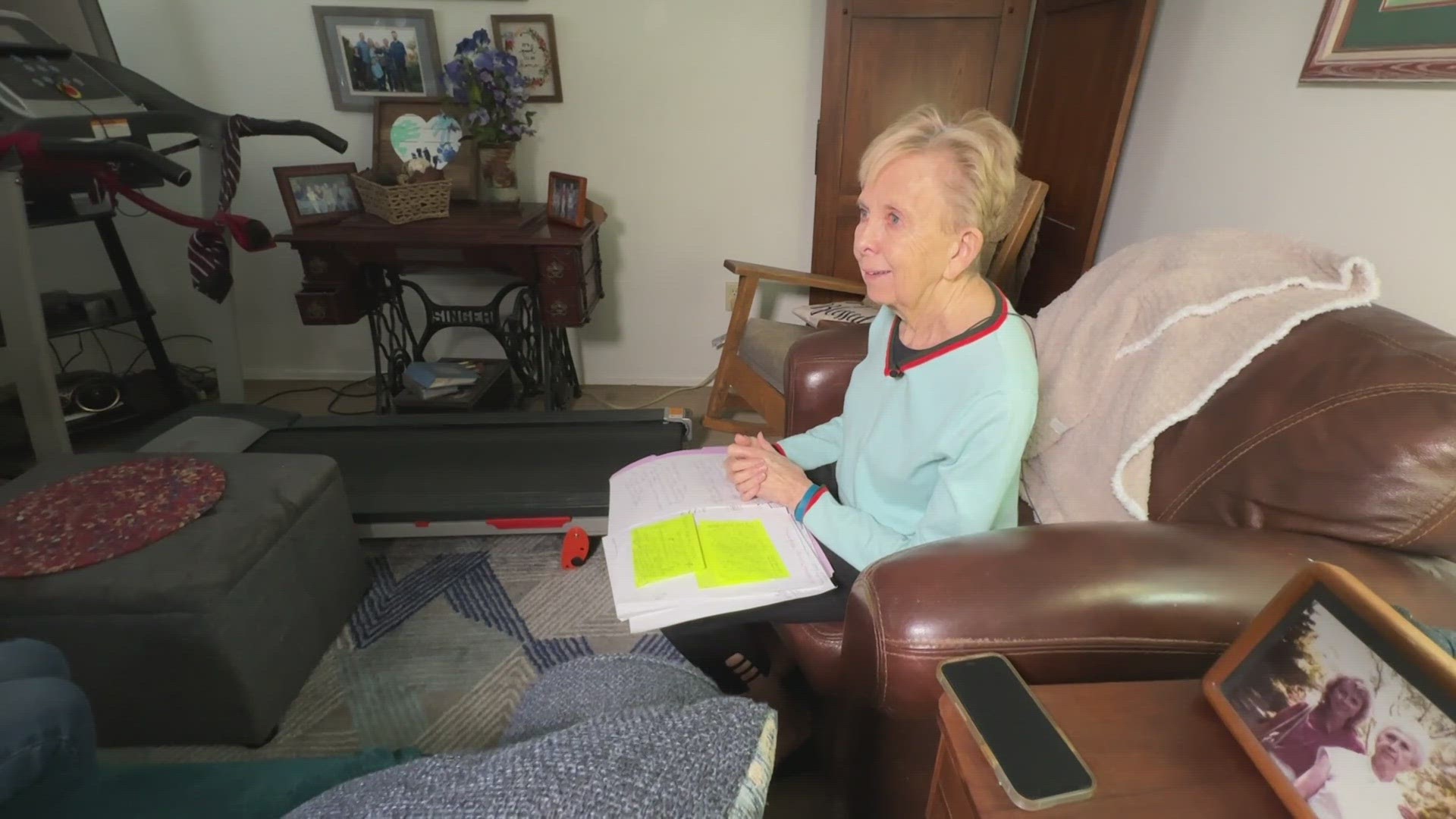MESA, Ariz. — An elaborate scam targeting a 75-year-old Mesa woman caused her to lose her life savings and she's told she can't get any of the money back.
Now, Susan Paasche-Guthrie is opening up about what happened to her earlier this month in hopes of preventing it from happening to anyone else.
"It was just gone. There was my emergency cushion, whatever fund was just gone," Paasche-Guthrie said.
Mesa woman instructed to drain her savings and deposit it into Bitcoin ATM
Paasche-Guthrie worked as a real estate appraiser and worked hard to save up $25,000. When she was 73, medical issues led her into retirement.
“I had taken, you know, a few years accumulating that," she said.
A year ago, she was diagnosed with a rare blood disease so her savings account was crucial.
“The treatments for it are getting more and more expensive and normally, that would be what my fund was there for," Paasche-Guthrie said.
But now, at almost 76 years old, Paasche-Guthrie's savings are gone.
She was the target of a scam. Earlier this month, when she logged onto her computer, Paasche-Guthrie saw a message that looked like it was from Microsoft saying she had been hacked. The message urged her to call a phone number listed on the screen.
“I spoke to two different individuals who appeared to be legitimate and they gave me their names and their IDs in case we got disconnected," Paasche-Guthrie said.
She took diligent notes as the call continued. She was told her bank account had been compromised, too, and a bank employee may have been involved in the hack. The scammers told her that her savings were actively being transferred to a child pornography site.
She was warned if she didn't move her money to a new account, and fast, she could lose it and face criminal charges.
Paasche-Guthrie was told that her phone was compromised, too, so she shouldn't make any calls to family or friends.
“I was probably on speakerphone for four hours while he talked me through everything," Paasche-Guthrie said. "Reassured me of everything, and the urgency, and all that sort of thing before I took the money out of my account.”
Paasche-Guthrie deposited her money from the bank and after leaving, she was instructed to take the cash to a Bitcoin ATM inside the Main Street Mart in Mesa.
She deposited all $25,000.


“We put it into a secure wallet so that it couldn't be hacked by the hackers. And we'd just put it back into my account the next day, or whenever it was clear," Paasche-Guthrie recalled.
But the next day, a family friend heard about what happened and told her she had been scammed.
Paasche-Guthrie and her daughter called Mesa PD and filed a report with the Internet Crime Complaint Center. Mesa PD told 12News there's very little local law enforcement can do when it comes to these elaborate scams.
Unfortunately, Paasche-Guthrie was told by her bank that because she took the money out herself, there was no way to get it back.
“It's just overwhelming, you know, and realizing what I'd done," Paasche-Guthrie said. "On Tuesday night, I was laying in bed beating myself up.”
Paasche-Guthrie's daughter has created a GoFundMe page to help her mom. You can find a link to donate here.
"I know there's much more to life than dollars. I have lots of blessings in my life," Paasche-Guthrie said. “They're just taking advantage of really vulnerable people.”
Tips to prevent this from happening to you or a loved one
According to the FBI, scams are sophisticated. They provided these tips to protect yourself:
- Legitimate customer, security, or tech support companies will not initiate unsolicited contact with individuals.
- Ensure computer anti-virus, security and malware protection is up to date and settings are enabled to reduce pop-ups.
- Be cautious of customer support numbers obtained via online searching. Phone numbers listed in a “sponsored” results section are likely boosted as a search of Search Engine Advertising.
- If a pop-up or error message appears with a phone number, don’t call the number. Error and warning messages never include phone numbers.
- Resist the pressure to act quickly. Criminals will urge the victim to act fast to protect their device or account.
- Do not give unknown, unverified persons remote access to devices or accounts.
- Do not download or visit a website that an unknown person may direct you to.
- Do not trust caller ID readings as criminals often spoof names and numbers to appear legitimate. Let unknown numbers go to voice mail and do not call unknown numbers back.
- Never trust any company tech requesting personal or financial information.
Up to Speed
Catch up on the latest news and stories on the 12News YouTube channel. Subscribe today.

